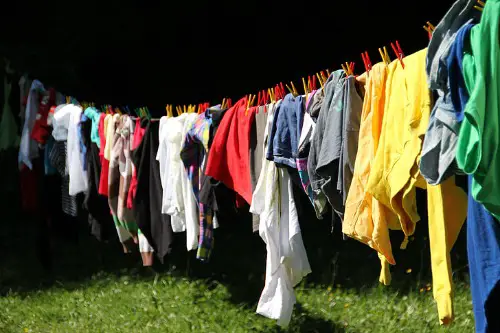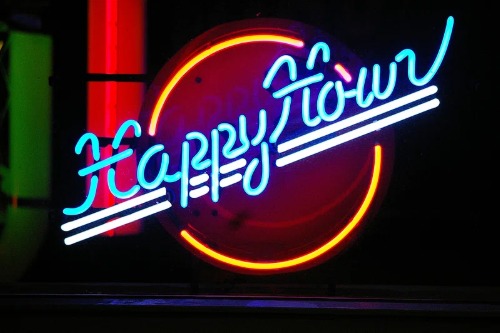1. New York Tried to Ban Flavored Popcorn

In 2011, New York considered banning certain flavored popcorn as part of a broader fight against unhealthy foods. Officials were worried that caramel and cheese-coated popcorn were contributing to obesity. The proposal targeted movie theaters, where these snacks were most commonly sold. Many people were outraged, feeling like the government was going too far in trying to control personal food choices, according to News9.
Moviegoers argued that flavored popcorn had been a staple for decades, and banning it wouldn’t suddenly make people healthier. Critics also pointed out that much unhealthier foods remained untouched by the law. The backlash was so strong that the proposal quickly lost momentum and never passed. In the end, New Yorkers kept their right to enjoy buttery, cheesy, and sugary popcorn at the movies.
2. Vermont Tried to Ban Clotheslines

In the mid-2000s, some Vermont homeowners’ associations wanted to ban clotheslines, claiming they were an eyesore, according to Tom Geoghegan from the BBC. They argued that hanging laundry outside made neighborhoods look messy and outdated. This didn’t sit well with environmentally conscious Vermonters, who saw it as an attack on energy-saving habits. The backlash was so strong that the state eventually passed a law protecting people’s right to air-dry their clothes.
The law, known as the “Right to Dry” act, prevented HOAs from enforcing blanket bans on clotheslines. Supporters pointed out that banning them forced people to use energy-hungry dryers, increasing electricity use for no good reason. Many saw it as a case of aesthetics being prioritized over practical, eco-friendly choices. In the end, Vermont sided with common sense and kept clotheslines legal.
3. California Tried to Ban Plastic Straws—With Jail Time

In 2018, California cracked down on plastic straws, aiming to reduce ocean pollution and single-use plastics, according to ABC News. While most people supported efforts to reduce waste, the original version of the bill raised eyebrows. It proposed jail time for restaurant workers who gave out plastic straws without customers asking. The idea of someone serving iced coffee ending up behind bars for a straw was so extreme that lawmakers had to revise the bill.
The final version softened the penalties, turning it into a fine instead of potential jail time. Restaurants were still required to only give straws upon request, but enforcement became more reasonable. Some businesses switched to paper straws, which sparked a whole new debate about their durability. While California kept its anti-plastic stance, it at least avoided making waiters criminals over a piece of plastic.
4. Tennessee Tried to Ban Sharing Netflix Passwords

In 2011, Tennessee lawmakers pushed a bill that made sharing streaming service passwords a crime, according to Ellis Hamburger from Business Insider. The entertainment industry argued that password sharing was a form of theft, costing companies millions. While the law was aimed at large-scale account sellers, it was worded so vaguely that even friends sharing a Netflix login could be considered criminals. People were shocked that something so common could technically be illegal.
The law allowed streaming companies to take action against unauthorized sharing, but enforcement was a different story. It wasn’t like police were knocking on doors asking for Netflix passwords, but the potential for fines was there. Critics saw it as an overreach, especially since password sharing had been an unspoken norm for years. Despite the law, most people continued sharing their accounts without fear.
5. Arizona Tried to Ban Nudity in Your Own Home

Arizona lawmakers once proposed a bill that could have made it illegal to be naked in your own house—if someone outside could see you. The goal was to prevent intentional flashing, but the bill’s wording was so vague that accidental exposure could also be punished. This meant that simply walking past a window after a shower could technically break the law. The idea that people could be arrested for something so innocent caused a major backlash.
Critics pointed out that Arizona’s intense heat made it especially unfair, as many people wore minimal clothing at home. It also raised concerns about privacy, with people arguing that they shouldn’t have to live in fear of being reported by a nosy neighbor. The bill ultimately didn’t pass, but it left residents extra cautious about open windows. In the end, common sense prevailed, and Arizona avoided criminalizing at-home nudity.
6. Florida Tried to Ban Saggy Pants

Florida lawmakers have tried multiple times to ban saggy pants, arguing that they promote delinquency and disorder. Some cities even passed local ordinances making it illegal to wear pants that sagged below the waist. Offenders could face fines, and in some cases, even community service for violating the dress code. Many saw this as a ridiculous overreach, targeting young Black men rather than solving real issues.
Critics pointed out that fashion choices shouldn’t be a criminal offense, especially when no other clothing styles were being policed. Some legal experts even warned that such laws were unconstitutional, as they restricted personal expression. Over time, many of these bans were overturned or simply not enforced. However, a few cities in Florida still have saggy pants ordinances on the books.
7. Alabama Tried to Ban S** Toys

Alabama has one of the strictest laws against selling sex toys, dating back to the late 1990s. The law specifically banned the sale of devices meant for “intimate stimulation,” though there were exceptions for medical purposes. This led to some bizarre workarounds, like labeling products as “educational devices” to avoid legal trouble. Many saw the law as outdated and intrusive, restricting personal freedoms in a completely unnecessary way.
The ban has been challenged in court multiple times, with critics arguing it violates privacy rights. Even though similar laws were struck down in other states, Alabama has stubbornly held onto its restrictions. Despite this, many shops still sell these products, often using legal loopholes to stay in business. While enforcement is rare, Alabama remains one of the few states with such a law on the books.
8. Texas Tried to Ban Weird Baby Names

Texas law once gave officials the power to reject baby names deemed too strange or offensive. The rule mostly applied to names with special characters or anything considered obscene. While parents weren’t completely restricted, they had to pick again if their chosen name was flagged. This meant that names like “@ngel” or “King$$” could be denied.
Most people didn’t run into issues, but it did raise questions about personal freedom. Critics pointed out that what’s considered “weird” is subjective, making enforcement tricky. Some parents tried appealing rejections, though most eventually chose different names. Over time, Texas relaxed some of its restrictions, but rules against special characters still exist.
9. Oregon Tried to Ban Self-Serve Gas

For decades, Oregon made it illegal for drivers to pump their own gas, citing safety concerns and job protection. The law was so strict that visitors from other states often got scolded for trying to fill their own tanks. Many Oregonians were used to full-service stations and didn’t see a problem with the ban. But as self-serve became the norm everywhere else, people started questioning why Oregon was so different.
The law wasn’t fully lifted until 2023, when the state finally allowed most gas stations to offer self-service. Some residents worried that it would lead to job losses, but many were just happy to have the option. Before the change, rural counties had already been allowed to pump their own gas due to staffing shortages. Now, most Oregonians can finally experience what the rest of the country has been doing for decades.
10. Kentucky Tried to Ban Selling Cold Beer at Grocery Stores

For years, Kentucky had a bizarre law that allowed grocery stores to sell warm beer but not cold beer. Lawmakers believed that forcing people to chill their beer at home would prevent impulse drinking. The rule frustrated customers, who found it inconvenient and unnecessary. Meanwhile, liquor stores were allowed to sell cold beer, making the whole system seem even more illogical.
Critics argued that the law didn’t actually stop anyone from drinking—it just made buying beer more annoying. In 2017, the restriction was finally struck down in court, bringing Kentucky in line with most other states. Grocery stores celebrated, and customers no longer had to choose between warm beer or an extra trip to the liquor store. It was a small but significant victory for common sense.
11. Indiana Tried to Ban Pi

In 1897, an Indiana lawmaker proposed a bill that attempted to redefine the mathematical constant pi. The bill suggested changing pi’s value to a more “rational” number, closer to 3.2, to make calculations easier. Mathematicians were horrified, pointing out that pi is a fundamental constant that can’t simply be legislated away. The idea of legally changing math was so absurd that it became a legendary example of bad legislation.
Fortunately, the bill never became law, thanks to a visiting professor who convinced lawmakers to abandon it. If it had passed, Indiana would have been the only place in the world using a legally mandated incorrect version of pi. The failed bill is still widely mocked in science and math circles today. It serves as a reminder that lawmakers should probably leave mathematics to mathematicians.
12. Missouri Tried to Ban Firefighters from Protesting

In 2021, Missouri lawmakers introduced a bill that would have made it illegal for firefighters to protest workplace conditions. Supporters argued that emergency responders shouldn’t be allowed to strike, as it could put lives at risk. However, critics saw it as an attack on workers’ rights, especially since firefighters often protest for better equipment and safer working conditions. The bill sparked major backlash, with many arguing that silencing first responders was the wrong approach.
Ultimately, the bill failed to pass, as public support for firefighters was too strong. Many people pointed out that other professions, like teachers and nurses, were allowed to protest without issue. Firefighters argued that their demands weren’t about politics but about public safety. Missouri lawmakers quietly dropped the proposal, letting firefighters keep their right to speak out.
13. North Carolina Tried to Ban Happy Hour

North Carolina has some of the strictest alcohol laws in the country, and one of the strangest bans is on happy hour. Unlike most states, North Carolina doesn’t allow bars and restaurants to offer temporary drink discounts at certain times of the day. Instead, they can only have all-day specials, meaning no two-for-one margaritas or half-off beers after work. The law was originally meant to reduce drunk driving, but many argue it does little to stop overconsumption.
Critics say the ban hurts both businesses and customers, as it removes a major incentive for people to visit bars during slower hours. Many also point out that happy hour is legal in most states without any major problems. The law is still in effect today, making North Carolina one of the few places where happy hour is technically illegal. While some have pushed for change, lawmakers have been slow to act.
14. Wisconsin Tried to Ban Butter Alternatives

For decades, Wisconsin had a law that made it illegal to serve margarine instead of butter in public institutions like schools and prisons. The state’s dairy industry is one of the biggest in the country, and lawmakers saw margarine as a direct threat. Under the law, restaurants had to ask customers if they wanted margarine instead of butter before serving it. The idea was to protect Wisconsin’s dairy farmers, but it came off as an unnecessary restriction on personal choice.
The strictest parts of the law were eventually repealed, but Wisconsin’s preference for butter remains strong. Even today, margarine restrictions still exist in certain government institutions. Dairy remains a major part of Wisconsin’s identity, so anything that threatens butter will likely face resistance. The state might not have an official margarine ban anymore, but its love for dairy products is as strong as ever.


